If Harper really is preparing his exit, what will his legacy to Canada be?
Nov 26th, 2010 | By Counterweights Editors | Category: Ottawa Scene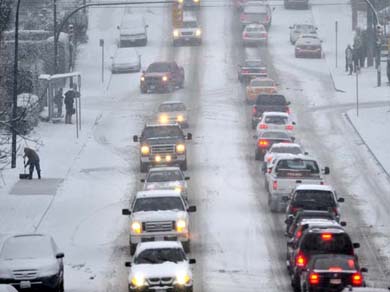
This is Vancouver, in November? Apparently it is, on the morning of November 25, 2010, near Fraser Street and King Edward. Photograph by: Ian Smith, PNG. Canada, it would seem, really is starting to change, at last?
The news that “NL premier Danny Williams announces resignation” will bring different thoughts to different minds on the Canadian mainland. In Ontario, eg, the point that his “resignation comes before a provincial election scheduled for October” will prompt some to wonder yet again whether Dalton McGuinty, also facing a provincial election scheduled for October, and also “elected premier in 2003,” might be announcing his resignation soon as well. (Our continuing advice on this front: don’t hold your breath.)
Others who were especially struck by the speculations of former Brian Mulroney chief of staff Norman Spector a few days ago, “Is Harper preparing his exit?,” will wonder again whether Premier Williams’s resignation foreshadows some similar announcement from the office of the Prime Minister of Canada himself, not too much further down the road? (You “have to wonder,” Mr. Spector is advising, “why else his government would have granted Bill Clinton’s foundation a special designation that puts it on the same foot for tax purposes as domestic charities.”)
The latest EKOS poll on Canadian federal politics – which reports that “the Conservatives are once again establishing a significant lead over the faltering Liberal party” – may raise at least some doubts about Norman Spector’s speculation. And something similar could be said about the prospect that, in the new age of Rob Ford, the Harper Conservatives may finally make inroads into the Greater Toronto Area, with the victory of former police chief Julian Fantino in the Vaughan by-election this coming Monday.
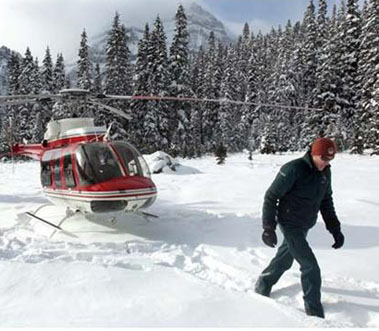
And of course there’s lots of snow in Alberta right now too: “Parks Canada Mountain Safety Programs manager Marc Ledwidge disembarks from a helicopter on a tour which included a stop at Shadow Lake. Photograph by: Ted Rhodes, Calgary Herald.”
At the same time, even in the latest EKOS poll the Harper “Conservatives are now very close to their moving average over the past year, which is still well short of their achievement in the last election” (to say nothing of the majority government that continues to elude the Harperland juggernaut). Even if they do win in Vaughan this coming Monday, there is not much as yet to confirm that some Rob Ford effect is breaking out federally in the Toronto region at large. (The Conservatives have gone up a bit in the region since the last EKOS poll, from 34% to 36% in round numbers, but so have the Liberals, from 36% to 40%. And, in the words of another recent headline, “EKOS accurately predicts Rob Ford’s victory,” closer than anyone else!)
* * * *
So … just supposing Norman Spector is onto something, and Stephen Harper actually has already started wiring himself for his next career – on the wider international scene, say, where “access to NATO leaders [grateful for Canada’s recent Afghanistan extension, eg], and to people like Bill Clinton, would be a lucrative calling card.” Danny Williams, it has been reported, is justifiably proud enough of his legacy to the people of Newfoundland and Labrador. If Stephen Harper were to follow in his footsteps, even before the next federal election (in which, even with the latest polls, it still seems likely that he would fail to win a majority government, yet again), what would be his legacy to the people of Canada?
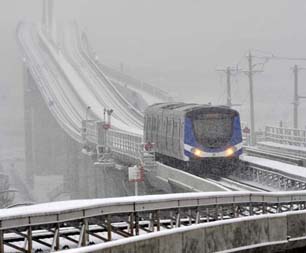
“This Canada Line train couldn't make it across the Fraser River Bridge between Richmond and Vancouver on Thursday because of ice and snow. Photograph by: Ian Smith, PNG.”
Our own view here is quite clear and quite certain. Without any doubt, Mr. Harper’s greatest contribution to Canadian federal politics has been to at last bring Western Canada (or at least the most western parts of Western Canada) more securely (and contentedly) into the modern Canadian federal system – or the northern North American confederation of 1867 (legatee of the transcontinental multiracial northern fur trade, from the Atlantic to the Arctic to the Pacific, in the wake of the US Civil War, etc, etc), or whatever else you might like to call it.
The latest EKOS poll offers some pretty clear evidence of this as well (again for at least the most western parts of Western Canada). Among other things it asked: “How much do you trust the government in Ottawa to do what is right?” The regional breakdown of the “Almost never” answers was: Saskatchewan/Manitoba 31%, Quebec 30%, Atlantic Canada 23%, Ontario 23%, British Columbia 16%, and Alberta 15%! At the other extreme, there was a parallel regional breakdown for “Most of the time”: Quebec 24%, Saskatchewan/Manitoba 24%, Atlantic Canada 27%, Ontario 28%, British Columbia 33%, and Alberta 37%. (Or, in the age of Stephen Harper BC and Alberta are the provinces both least dissatisfied and most satisfied with the federal government in Ottawa. Tell that to someone who says Canada is a Central Canadian conspiracy!)
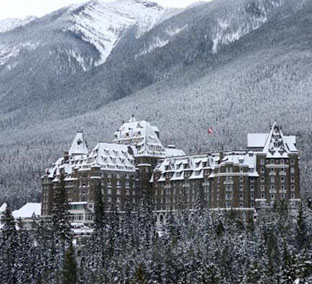
“The historic and majestic Banff Springs Hotel sits amidst the frosty valley foilage ... Photograph by: Ted Rhodes, Calgary Herald.”
The great failure of Stephen Harper in this context, in our view, is that the late 20th century Western regional critique of Canadian federalism has included some potentially very positive and constructive elements, from coast to coast to coast, which Mr. Harper now seems to have quietly given up on even trying to mobilize. At its best, at any rate, the West in the past generation (perhaps especially its most westerly and most prosperous parts) has spoken up for a more confident and forthright – and more democratic and regionally balanced –Â federation of the 21st century, less hamstrung by the obsolete genteel hypocrisies of an earlier era in the St. Lawrence Lowlands of southern Ontario and western Quebec.
Down on the ground, in this world of we ordinary people, the extent to which this western view of democratic reform has at last acquired a popular Canada-wide constituency is reflected in the recent Angus Reid “online survey … conducted in the days after Conservative government senators killed a bill that a majority of elected MPs in the Commons – sitting in Opposition – supported.” This survey showed that: “Most Canadians–69 per cent–support the idea of an elected Senate … while just 30 per cent would like to see the upper chamber abolished altogether.” Moreover, a “sizable majority — 63 per cent–supports a nationwide referendum to decide the future of the senate.” And these “survey findings are consistent with poll results in the past two years.”
Mr. Harper began his career as minority prime minister of Canada with some inspiring rhetoric about the present still unelected and unreformed Senate of Canada as a “19th century relic.” You can say (and some still do) that he has tried to introduce serious albeit merely “step by step” Senate reform proposals, but the opposition majorities in the parliaments he has faced as a minority prime minister have not been prepared to co-operate. Yet in fact Mr. Harper has not done what any serious proponent of Senate reform would have to do to convince parliamentary majorities. His step by step proposals have not even touched on the questions of regional and provincial representation that are so crucial (especially, eg, in Canada’s one francophone-majority province of Quebec). Mr. Harper has been content to use Senate reform as a low-minded wedge issue, in an effort to shore up his partisan regional support, without wading into the deeper (and no doubt more challenging and risky) waters of Canadian patriotism and idealism, that will finally need to be stirred if any kind of serious Senate and other democratic reform in our 19th century relic of a political system is ever going to happen.
Meanwhile, the recent Angus Reid survey also “showed 61 per cent believe Harper’s decision to name Conservatives to the upper chamber despite his longstanding opposition to an appointed senate is hypocritical.” Yesterday Gloria Galloway at the Globe and Mail was wondering “Is Harper systematically ‘snuffing’ out democracy in Senate?” She went on: “Opposition MPs are worried their private-member’s bills will meet a similar fate to that of Bill C-311, the NDP climate-change legislation that was killed without debate last week by the Conservatives in the Senate – or that the bills will just be allowed to die … And constitutional experts say any move by Conservative senators to block the advancement of opposition private-member’s bills as the Prime Minister Stephen Harper locks his grip on the Red Chamber later this month would be an abuse of government power.”
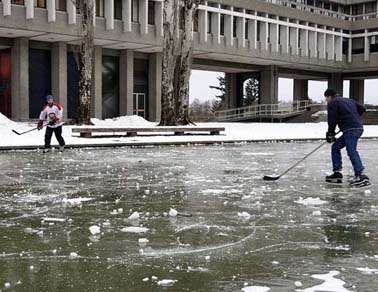
 “While a light snow fell Wednesday at Simon Fraser University, a few guys decided to get in some passing drills on the frozen pond. Photograph by: Dixon Tam, Special to the Vancouver Sun.” (Notice jersey worn by one guy in Western Canada.)
Mr. Harper, it has been said, never reads the Globe and Mail. So he will no doubt not be troubled by such mere Central Canadian journalism. Yet if Norman Spector’s recent speculation is more or less on the money, and Stephen Harper actually has already started wiring himself for his next career, beyond our modest shores as it were (a kind of Michael Ignatieff in reverse?), his legacy to the people of Canada is going to be so much less than it might have been, if he had really had the courage and breadth of vision to seriously dig into the long overdue democratic reform of the 19th century relic that remains the unelected and unreformed Senate of Canada. As matters stand, he will just be remembered as the prime minister who made more egregiously porcine old-style raw patronage Senate appointments, in a shorter period of time, than any other holder of the office since 1867 (or something like that). The West in this sense has not conquered the bad old system back east. It has finally given in and even made things worse than before – in a far shorter time than many of us in other regions who still do believe in serious Senate reform hoped was possible. (And perhaps this is why more people in Saskatchewan and Manitoba than in any other region of the country – including Quebec – still “almost never … trust the government in Ottawa,” even with PM Harper from Calgary sitting so aggressively on the throne in the PMO?)


